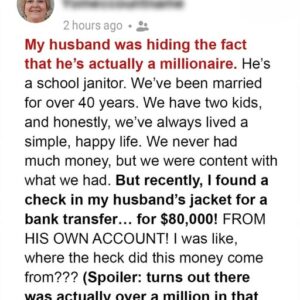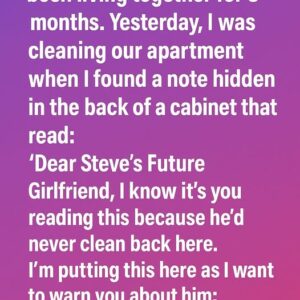I’ve cleaned office towers long enough to know the things people leave behind say more than what they take home. Coffee rings on quarterly reports. A cracked photo frame facedown in a drawer. A list of New Year’s resolutions someone gave up on in March. But nothing in fifteen years of mops and midnight floors prepared me for the Tuesday I slid my handle under a CFO’s mahogany desk and knocked loose a wallet fat enough to choke a cash counter.
Ten thousand dollars. Five tidy bands of twenties, crisp as if they’d just left the bank. No cards. No license. Just money, and one folded slip with an address written in careful block letters: 4782 Maple Grove Lane.
My childhood home.
I’m Reuben Thorn. Night cleaner. Widower. Son of a locksmith who could pick any deadbolt and never once picked the easy way out. The moment I saw that address, the cash stopped being a question and turned into a problem with a heartbeat. My father’s voice cut through the shock like it always did: Character is what you do when nobody’s watching. I’d heard it when I found a twenty at the grocery store as a kid. I heard it again now, louder than the hum of the HVAC and the city lights spread beneath the twenty-third floor like scattered stars.
I could have logged the wallet with security, written an incident line in small letters, and gone back to floors that never judged me. Instead, I clocked out at six, drove while the morning made ghosts out of exhaust, and idled in front of a house that looked like a memory wearing new paint. The maple where Dad hung my tire swing was gone. The yellow Mom painted had been replaced with the gray you buy when a designer tells you gray is what success looks like. I killed the engine and walked the path I’d run a thousand times with skinned knees.
The door opened on a man who could have been my reflection twenty years from now. Same crooked nose I broke on a Little League pop-fly. Same pale scar above the right eyebrow. Same way of favoring the left foot when he settled his weight. Shock drained the color from his face; tears put it back.
“Dear God,” he whispered, one hand braced on the jamb. “Reuben, is it really you?”
“I… brought a wallet,” I said, because the brain grabs any line when the ground tilts.
“I’m Clifton,” he said. “Your father’s twin. The one Dennis told everyone was dead.”
The wallet slipped from my hand and hit the porch. The bands broke. Money fanned across the boards like leaves.
Dad had never lied about the little things. He told me the goldfish died and didn’t try to sell me a farm upstate. He told me Mom wasn’t coming back and never dangled hope like a treat. He’d taught me locks and honesty and quiet. He’d folded our life small after Mom disappeared when I was eight, sold this house in a week, and never let the past get a foothold. Now a man wearing my father’s face was standing in my mother’s doorway telling me the biggest thing was a lie.
Inside, the bones of the house were the same even if everything on them was new. The hallway still turned right where I used to skid in socks. The kitchen window still looked out over a yard with no swing. The CFO’s voice—calmer now—filled the space.
“I go by Mitchell at work,” he said, almost apologetic. “Middle name. Clean paper. Easier to be a Mitchell than a Thorn in corporate America.”
“Easier than being dead, you mean,” I said. It came out sharper than I intended.
He nodded once. “Sit. Please.”
We took chairs at the table where I’d eaten blueberry pancakes every Sunday until the Sunday there weren’t any. He set the wallet between us as if it were evidence.
“You found that in my office,” he said. “Of all the people in Detroit, Dennis’s boy found it. If you believe in coincidence, fine. I don’t.”
“Why is my old address in it?” I asked. “Why have I never heard your name?”
“Because your father chose to bury it,” he said. “And because I let him.”
He let the silence stretch until it could hold what came next.
“Dennis and I were the same until the one day we weren’t. Twins give people ideas—two bodies, one mind—but that’s not how it works. He stayed with your mother when her bad days started to outnumber the good. I ran. I told myself I was chasing a career out west. The truth is, I was chasing anything that wasn’t the mess we were in.”
Addiction has a sound when it’s in a house. Bottles whisper. Doors slam. Apologies wear grooves. I remembered the smell of antiseptic and sugar on Sunday mornings, the way Mom sang off-key when she was better and stared at the ceiling when she wasn’t.
“There was a night,” he said, voice rough. “You were at a neighbor’s. Your mother’s dealer showed up and things went bad. I was home for the first time in months and I made it worse. We fought. He left. Your mother fell. There was blood. Dennis came in, saw me, saw her, and something in him burned shut. He blamed me. I blamed myself. We buried her without telling the truth to anyone who didn’t absolutely need it. The next day, I bought a bus ticket. Dennis told the family I died in a car wreck in California. He told it so hard he made it real.”
I felt the kitchen tilt again. “So you let him raise me to believe he had no one.”
“He raised you to believe he was the only one you needed,” Clifton said, not unkindly. “And for a long time, he was right. I sent money when I could. He returned every envelope. I called from pay phones. He hung up. When I got clean and steady, I came back—not to your door, but to this block. I bought this house when it came up at auction because I couldn’t stand the idea of strangers erasing your mother’s laugh from these walls. I told myself I was preserving something for you both. Maybe I was just preserving myself.”
The $10,000 sat between us like a dare.
“And the cash?” I asked.
“Insurance,” he said. “I keep an emergency roll for things I can fix fast. A furnace that dies. A retainer for a lawyer at two a.m. A kid with a dream and no safety net. It started as a habit from years of running. Then it became a tool.”
“You’re the CFO,” I said. “You could wire anything you wanted.”
“The bank takes time. Regret moves fast.”
We picked up bills together, the way people pick up pieces when the story breaks. He counted out ten thousand, bound them back into five neat stacks, and slid the wallet toward me.
“It’s yours,” I said. “I came to give it back.”
“I know,” he said, studying my face. “That’s why I’m going to ask you to keep it—if you’ll let me tell you what it’s for.”
He reached into a drawer and drew out a thin folder. Inside was a deed—4782 Maple Grove, paid in full—and a simple legal letter.
“I’d like you to choose,” he said. “You can take the cash, no strings, and walk out of here knowing you did the right thing and got a break you’ve earned ten times over. Or you can use this to sign as co-trustee on this house with me and decide what we do with it. Sell it and fund a scholarship in your mother’s name at the community college you once told your father you might attend. Keep it and turn it into a recovery scholarship home—three beds, strict rules, second chances for women who need them. Or tear the deed up and tell me to stay gone. You get to write what comes next.”
“Why me?” I asked, throat tight. “You don’t know me.”
“I know enough,” he said. “You returned a wallet you could have buried. You live the way my brother taught you to live. I failed him. This is as close as I get to doing one thing he’d nod at.”
Grief isn’t a single weight. It’s a shifting one. In that kitchen, the ache for a mother I barely remembered met the respect for a father who had lied to save what he could and the shock of an uncle who’d come back slow and sideways until he was sitting across from me trying not to shake.
“I clean your office at night,” I said, because humor is a hinge when the door is heavy. “If I take this trustee thing, I’m not calling you ‘Mr. Mitchell.’”
“Clifton,” he said. “Please.”
We spent the next hour walking through rooms and years. He showed me the scar in the floor where Dad dropped a wrench and swore, then made me say the alphabet backward as penance for new words. I showed him the spot under the window where the sun used to hit just right for puzzles. We stood in the yard where my swing once creaked and picked at what honesty was left between two men who had inherited the same face and very different guilt.
When I left, the deed folder was under my arm and the ten thousand stayed on the table. I drove to the cemetery instead of home and knelt at Janelle’s marker. “You always said stories find their endings when you start telling the truth,” I said. “I think one just did.”
Two months later, the house on Maple Grove held three beds, a chore chart, a lock box for meds, and a small framed photo of a woman with dishwater hair and a half smile—my mother, on a day laughter won. The plaque by the door reads: The Lawn-Thorn House, in memory of those we lost, for those still finding their way. Clifton signed the trust with a shaking hand and cried without apology. I signed with a steady one and felt my father’s palm ruffle my hair the way it used to before school.
At night, I still clean floors. Sometimes I clean the twenty-third. The CFO sticks his head out of meetings now and then and asks about the best mop heads, like we’re conspiring, which I guess we are. He offered me a slick security job with benefits. I told him I’d think about it. I like honest work and empty halls and the way this city looks from high enough that the problems shrink and the lights look like promises.
The wallet sits on my dresser with a single dollar inside—the first bill from the first donation a resident made when she got her first paycheck. I kept it as a reminder of a choice. Return what isn’t yours. Keep what matters. Build something that outlasts the story that broke you.
My father said sleep comes easy when your conscience is clear. He was right. Some nights, I hear two sets of footsteps in this house—the ones I knew and the ones I’m learning—and I sleep anyway. Because some truths arrive late, some families are built in the second act, and sometimes the address that undoes you is the same one that points you home.


